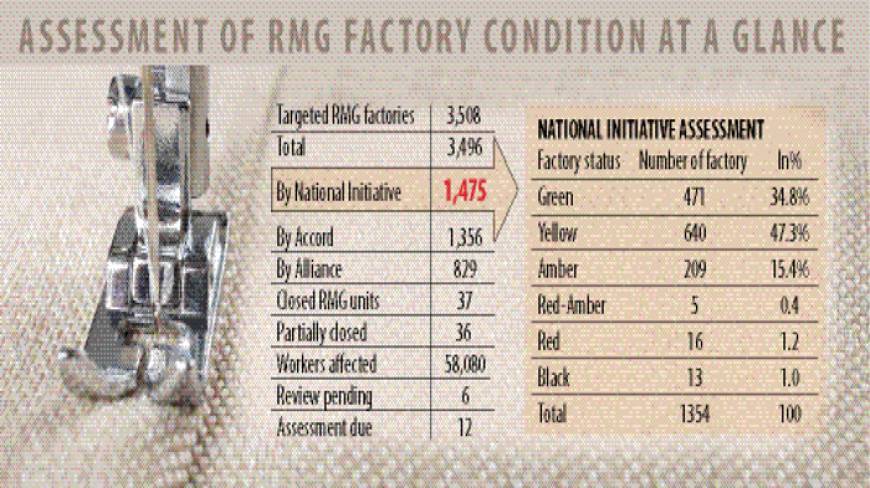The government’s inspection has found safety shortcomings in 274 of the garment factories not inspected by Accord or Alliance.
A report published yesterday has recommended detailed engineering assessment and remediation measures to make the 274 factories safe for workers. The inspection results, however, showed most of the factories were safe.
The inspection, conducted on structural, fire and electrical set-ups, was supported by the ILO and the governments of Canada, the Netherlands and the UK.
A number of 1,475 factories were brought under the inspection – which were not suppliers to the Western retailers who have launched two separate groups – Accord and Alliance to inspect their own supplier factories.
During the inspection which ended on 31st October, the government team assessed 1,475 factories. Of them, 34.8% received green mark (fully safe), 47.3% yellow mark (safe to some extent), 15.4% amber (having safety concerns and need DEA) and 0.4% red-amber (risky), 1.2% red (under assessment of review panel, and three already closed) and 1% black.
The number of factories with safety concerns is 214 or 15.8% of the factories assessed, said Syed Ahmed, inspector general of the Department of Inspection of Factories and Establishments (DIFE).
“The factories can be made safe undertaking remediation works. Then detailed engineering assessment will be done to make a final safety status of the factories that if they are safe or not,” he said.
Syed Ahmed said the DIFE has asked the owners to submit corrective action plans by three months as “the action plans will be sent to the government’s task force for vetting before approval and implementation.”
About financing the remediation works, he said: “It’s mainly the owners’ duty to ensure workers’ safety in the factories. However, as the government has some responsibilities, we will also try to find funding sources.”
Ahmed said they would keep up-to-date with owners about the progress in remediation works as ensuring safety is “the biggest challenge for us.” He said a total of 137 inspectors have been involved in four districts to monitor the works.
He said the factories without membership of BGMEA or BKMEA would be brought under the assessment and inspection, but the time was yet to be set.
He, however, expected it could take three to six months to take measures on the issue.
Ahmed claimed that the inspection has been done maintaining standards and there was no scope of compromising with the safety issue.
Srinivas Reddy, ILO country director, termed the completion of inspection as a “significant milestone.”
“Carrying out these inspections is a significant milestone yet it is only the beginning. Our full attention must now turn to remediation. ILO will help build the capacity of the Bangladesh authorities to put in place an effective system for all remediation and regulatory oversight once the support of partners ends.”
He urged the owners’ associations to actively work with the factory managements in preparation of corrective action plans.
Reddy said this should be done in the best interest of the workers’ safety, which would help restore confidence among the buyers.
Source: Dhaka Tribune










